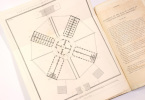[Samuel Hoare] [Society for the Improvement of Prison Discipline, and for the Reformation of Juvenile Offenders.]
Rules proposed for the government of gaols, houses of correction, and penitentiaries. Compiled from various acts of parliament for the regulation of prison, and selected from rules in force at the best conducted gaols in Europe : to which are added, plans of prisons on improved principles ; and a description, with plates, of A Corn Mill and Water Mill, adapted for the employment of prisoners. Published by the Society for the Improvement of Prison Discipline, and for the Reformation of Juvenile Offenders.
London, Printed by T. Bensley, 1820 1 vol. in-8 (23 x 14 cm) de VI-(1)-65 pages. 10 planches hors-texte (la plupart dépliantes). Voir le détail des sujets ci-après. Cartonnage de l'époque plein papier gris, relié sur brochure, non rogné, étiquette de titre imprimée au dos (d'origine). 1 planche détachée. Quelques rousseurs et feuillets jaunis, néanmoins excellent papier de qualité (papier vélin de cuve). légères usures au cartonnage néanmoins solide. First edition. "The society for the improvement of Prison Discipline, in submitting to the public the following suggestions respecting the proper regulations to be adopted in Prisons, deem it superfluous to detain their readers by endeavouring to prouve what is already obvious, that the judicious mangement of Gaols is a subject of the utmost importance. An intention has been imputed to this society, than which nothing can be more foreign from its real purpose, that of making the interior of a prison a more desirable residence than the habitations of the poor ; the motives which actuate the members of the society are allowed to be benevolent, but the consequences of carrying their views of reform or improvement into effect, are supposed by some persons to be mischievous ; it is presumed that offenders are intimidated, by the miseries and privations they have experienced or anticipate ; if prisons, it is said, are rendered places of comfort, where food and lodging are gratuitously provided, they become incentives to crime and a recompence for its commission. In this view of the subject, however, the society cannot coincide : it is true, they consider it desirable that prisons should be clean, and the food given to the prisoners, plain, wholesome, and sufficient ; but they are equally anxious that everything which borders on sensual gratification or unnecessary comfort should be entirely prohibited. They are of opinion that the punishment contemplated by the law should alone be inflicted, and that no collateral evils, the horrors of disease, and the corruption of principle, should be superadded ; but they are decidedly adverse to any permission of idleness, dissolute behaviour, or to any indulgencies, excepting those conferred as the reward of good conduct ; they are desirous that constant and imperative labour should occupy the prisoners, and prepare their minds for such instruction as may eradicate evil habits, and substitute good dispositions: a prison thus regulated offers no attraction to the vicious, and the society confidently appeal to the evidence of facts as confirming the deductions of reason, wherever this experiment has been fairly tried. It must be apparent to all who have directed their attention to this subject, that the system of Prison Discipline too. generally prevalent in England was confined to a single object, the safe custody of the prisoner ; and to one method of accomplishing that object, severe and sometimes unnecessary coercion : if the prisoner could be retained within the walls of a gaol by bars, by chains, or by subterraneous and unventilated dungeons, by the use of any rigour or privation ; this plan, aiming only at his personal security, was deemed sufficient: the possibility of reforming the criminal seems never to have been contemplated ; no rule was in force, no arrangement existed which could be referred to such a purpose: the attempt to disengage the culprit from long formed habits of vice, and to rekindle in his breast the latent sparks of virtue, were schemes known indeed by the writings of Howard, but generally regarded as the visionary efforts of an excessive philanthropy. Such has been the progress of public opinion, that it is not now requisite to dwell upon the expediency of making these attempts, or to contend against a system calculated to multiply offences, and to ripen indiscretion into crime; a new plan has been gradually developed, in which moral restraint removes the necessity of brutal violence ; in which the prisoner is justly considered as possessing rights which we must not v violate, and feelings which we must not wound, beyond what the sentence of the law demands: a system equally opposed to that dangerous indulgence which permits scenes of vice, drunkenness, or debauchery to be exhibited ; and to that useless cruelty, which, producing no beneficial effect in the way of example, tends to harden the character of those who are subjected to its operation ; a system, in short, which suppresses for a time at least many evil habits, and substitutes those of industry, decency, sobriety, and order. The strong interest taken by the public in this momentous question, the examples which have been adduced of the successful application of these principles to practice ; the zeal manifested by the magistrates in general throughout the country, and the appointment of committees in both houses of Parliament, furnish a well-grounded confidence that the improved system of Prison Discipline will now be fairly and fully tried. The society for the improvement of Prison Discipline have received so many applications for information respecting numerous particulars, that they apprehend they cannot more effectually consult the wishes or convenience of the public, than by an endeavour to collect and arrange those recommendations which the result of reflection and experience enables them to offer. Much consideration has been bestowed upon the plans which accompany this tract, and great assistance has been derived from the architectural skill of Mr. Ainslie, and Mr. Bullar, in the arrangement and illustration of these designs: these gentlemen have gratuitously afforded the Society most valuable aid, for which the Committee beg to express their sincere acknowledgments ; the object in view was to give such plans, as might best combine the advantages of inspection and classification, leaving it to the discretion of different districts to accommodate the same to their own local circumstances. With regard to the rules which are suggested, there is no pretension to originality ; the first aim of the society has been to obtain an accurate acquaintance with the actual management of the best regulated gaols ; to compare attentively the course pursued in each, with their practical consequences ; and then to select and combine, under one arrangement, those rules which appeared upon the whole most judicious and effective. The importance of providing employment for prisoners, and the difficulty of procuring it, have deeply engaged the attention of the society, but hitherto without enabling them to arrive at any conclusion which is universally applicable ; but there is one species of labour obtained by the introduction of mills, and especially of stepping mills, which may furnish constant occupation to a determinate proportion of the prisoners. The advantages derived from the use of mills in several prisons, have been very conspicuous, not so much perhaps in a pecuniary point of view, as in the moral benefits resulting to the prisoner. A stepping mill of a superior description, and which the Committee cannot too earnestly recommend for the employment of prisoners, has been lately constructed, on very ingenious principles, by Mr. Cubitt, Civil Engineer, of Ipswich. To the liberality and kind attention of this gentleman, the Committee are indebted for the annexed illustrations of the machinery, and explanation of its power and effects. . Should the recommendations here collected, be found useful in assisting those gentlemen, who unite the power with the inclination to promote the grand and progressive work of improvement in Prison Discipline, the object of the society will be fully attained. (Preface, London, 1st January, 1820, Samuel Hoare, Jun., Chairman of the Committee). Samuel Hoare Jr (9 August 1751 – 14 July 1825), chairman of the committee was a wealthy British Quaker banker and abolitionist born in Stoke Newington, then to the north of London. His London seat was Heath House on Hampstead Heath. He was one of the twelve founding members of the Society for the Abolition of the Slave Trade. The engravings are : 1. Plan of a County Gaols for 400 prisoners. Designed by George Ainslie. 2. Plan of a Gaol for on hundred and twenty prisoners. G.T. Bullar architect. 3. Plan of the Chapel and sleeping cells. 4. Plan of a house of correction for sixty prisoners. G.T. Bullar architect. 5. House of correction for twenty eight prisoners. G.T. Bullar architect. 6. Ground Plan of a design for a Prison Corn Mill. 7. Crofs section of design for Prison Mill shewing the elevation of Machinery. 8. Crofts sectiloln of design for Prison Mill, shewing the elevation of the tread wheels and method of working. 9. Longitudinal section of design for Prison Mill, shewing elevation of Machinery. 10. Plan and section for a Pump Mill. (complete). Very rare.
Reference : AMO-2714
Bookseller's contact details
Librairie L'amour qui bouquine
M. Bertrand Hugonnard-Roche
14 rue du Miroir
21150 Alise-Sainte-Reine
France
06 79 90 96 36
Payment mode



Sale conditions
Conditions de vente conformes aux usages de la Librairie Ancienne et Moderne.
 Write to the booksellers
Write to the booksellers





